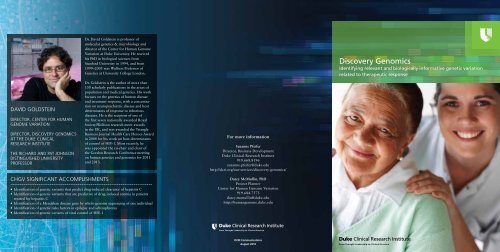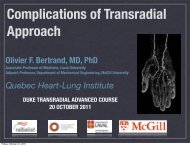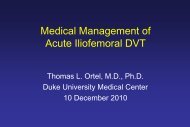Discovery Genomics - Duke Clinical Research Institute
Discovery Genomics - Duke Clinical Research Institute
Discovery Genomics - Duke Clinical Research Institute
You also want an ePaper? Increase the reach of your titles
YUMPU automatically turns print PDFs into web optimized ePapers that Google loves.
DaviD GolDstein<br />
Director, center for Human<br />
Genome variation<br />
Director, <strong>Discovery</strong> <strong>Genomics</strong><br />
at tHe <strong>Duke</strong> clinical<br />
researcH institute<br />
tHe ricHarD anD Pat JoHnson<br />
DistinGuisHeD university<br />
Professor<br />
Dr. David Goldstein is professor of<br />
molecular genetics & microbiology and<br />
director of the Center for Human Genome<br />
Variation at <strong>Duke</strong> University. He received<br />
his PhD in biological sciences from<br />
Stanford University in 1994, and from<br />
1999–2005 was Wolfson Professor of<br />
Genetics at University College London.<br />
Dr. Goldstein is the author of more than<br />
150 scholarly publications in the areas of<br />
population and medical genetics. His work<br />
focuses on the genetics of human disease<br />
and treatment response, with a concentration<br />
on neuropsychiatric disease and host<br />
determinants of response to infectious<br />
diseases. He is the recipient of one of<br />
the first seven nationally awarded Royal<br />
Society/Wolfson research merit awards<br />
in the UK, and was awarded the Triangle<br />
Business Journal Health Care Heroes Award<br />
in 2008 for his work on host determinants<br />
of control of HIV-1. Most recently, he<br />
was appointed the co-chair and chair of<br />
the Gordon <strong>Research</strong> Conference meeting<br />
on human genetics and genomics for 2011<br />
and 2013.<br />
cHGv siGnificant accomPlisHments<br />
----------------------------------------------------------------------------<br />
• Identification of genetic variants that predict drug-induced clearance of hepatitis C<br />
• Identification of genetic variants that are predictive of drug-induced anemia in patients<br />
treated for hepatitis C<br />
• Identification of a Mendelian disease gene by whole-genome sequencing of one individual<br />
• Identification of genetic risks factors in epilepsy and schizophrenia<br />
• Identification of genetic variants of viral control of HIV-1<br />
For more information<br />
Suzanne Pfeifer<br />
Director, Business Development<br />
<strong>Duke</strong> <strong>Clinical</strong> <strong>Research</strong> <strong>Institute</strong><br />
919.668.8196<br />
suzanne.pfeifer@duke.edu<br />
http://dcri.org/our-services/discovery-genomics/<br />
Darcy McMullin, PhD<br />
Project Planner<br />
Center for Human Genome Variation<br />
919.684.7573<br />
darcy.mcmullin@duke.edu<br />
http://humangenome.duke.edu<br />
DCRI Communications<br />
August 2010<br />
<strong>Discovery</strong> <strong>Genomics</strong><br />
Identifying relevant and biologically informative genetic variation<br />
related to therapeutic response
tHe imPortance of<br />
PHarmaco<strong>Genomics</strong><br />
in clinical trials<br />
--------------------------------------------------<br />
In today’s competitive environment, optimizing<br />
the drug development process in terms of cost,<br />
safety, and efficacy is perhaps more important<br />
than ever before. Pharmacogenomic studies<br />
increasingly are being integrated into clinical<br />
trials for this purpose as technologies and<br />
analysis techniques have rapidly advanced. By<br />
understanding how genetic variation impacts<br />
variability in drug response, pharmacogenomic<br />
studies can be used to make more informed<br />
decisions about how best to proceed with the<br />
development of a drug.<br />
Responders<br />
Non-responders<br />
Toxic responders<br />
All patients receiving<br />
same treatment<br />
An especially powerful use of pharmacogenomic<br />
studies is to identify subpopulations having<br />
unexpected adverse events or subpopulations<br />
of poor responders negatively affecting overall<br />
efficacy data. These subpopulation data can<br />
then be used as the basis for a companion<br />
diagnostic to screen patients, optimize dosing,<br />
and enhance the safety and efficacy profile<br />
of the drug. In some cases, this review may<br />
help salvage compounds that would not<br />
otherwise be viable. In other cases, it may<br />
help strategically differentiate the drug and<br />
position it for greater market penetration and<br />
premium pricing.<br />
Treat with conventional<br />
drug or dose<br />
Treat with alternative<br />
drug or dose<br />
tHe <strong>Discovery</strong> <strong>Genomics</strong> offerinG<br />
--------------------------------------------------<br />
The <strong>Duke</strong> <strong>Clinical</strong> <strong>Research</strong> <strong>Institute</strong> (DRCI)<br />
offers a comprehensive, integrated solution for<br />
incorporating pharmacogenomic studies into<br />
clinical trials, providing sponsors with an<br />
“insurance option” to quickly investigate<br />
genetic association with adverse events or<br />
efficacy after clinical trial completion.<br />
The DCRI provides:<br />
• Assistance with informed consent to ensure<br />
that collected samples can be properly<br />
analyzed after study completion<br />
• A dedicated, 40,000-square-foot purpose-<br />
built facility providing cost-effective,<br />
high-quality sample storage if storage<br />
is required<br />
• A single point of contact for kit development,<br />
supply and re-supply, and sample collection to<br />
streamline workflow<br />
• Scientific expertise and cutting-edge<br />
infrastructure for pharmacogenomic<br />
testing analysis through the DCRI’s<br />
David Goldstein, PhD, and the Center for<br />
Human Genome Variation (CHGV) within<br />
the <strong>Duke</strong> University School of Medicine<br />
• <strong>Clinical</strong> expertise and guidance on<br />
how to implement findings<br />
WHat you Will receive<br />
--------------------------------------------------<br />
• A detailed description of the methodology<br />
used in the genetic and statistical analysis<br />
• A detailed description of the results<br />
generated from the genetic analysis<br />
• Guidance on how to apply the findings in<br />
the clinical setting and in future<br />
development studies<br />
• Recommendations for possible follow-up<br />
genotyping work or functional<br />
follow-up studies<br />
• A final study manuscript suitable for<br />
submission for publication<br />
• A timely turnaround, specified in advance<br />
and based on project-specific activities<br />
Genetic testinG caPabilities<br />
anD exPertise<br />
-----------------------------------------------<br />
Pharmacogenomic testing and analysis is<br />
performed by the Center for Human Genome<br />
Variation (CHGV). The CHGV is capable<br />
of fully supporting a wide range of genetic<br />
studies in all phases of clinical research. While<br />
each project is customized, the CHGV typically<br />
follows a two-stage approach, starting with<br />
a genome-wide association (GWA) study to<br />
examine common genetic variation and<br />
proceeding, if needed, with whole-genome<br />
or whole-exome sequencing to identify<br />
rare variants.<br />
Our expectation is that for studies of efficacy<br />
involving large numbers of patients, analyses<br />
would normally begin with GWA studies,<br />
moving on to whole-exome or whole-genome<br />
sequencing as needed. Studies of rare adverse<br />
drug reactions normally involve whole-exome<br />
or whole-genome sequencing.<br />
cost-effective sequencinG<br />
noW a reality<br />
-----------------------------------------------<br />
The CHGV provides particular expertise<br />
in sequencing to investigate rare drug<br />
events occurring in less than 5% of patients.<br />
The CHGV can perform whole-genome or<br />
whole-exome sequencing studies in a timely,<br />
cost-effective manner using a small number<br />
(20–50) of patient samples, in<br />
part because it has compiled<br />
a large and growing reference<br />
database that already contains<br />
over 200 control genomes that<br />
have been sequenced at high<br />
coverage. The availability of<br />
these control genomes means<br />
that for rare adverse reactions,<br />
it is possible to sequence only<br />
those individuals with the<br />
adverse reactions and to use<br />
existing control data for<br />
comparison, saving on costs.<br />
analytic exPertise Drives<br />
novel <strong>Discovery</strong><br />
-----------------------------------------------<br />
The CHGV excels at analyzing large amounts<br />
of genetic data. Many software applications<br />
developed by CHGV bioinformaticians are<br />
now used by leading research labs to help<br />
transform genetic data into a usable format<br />
and enable efficient discovery activities. This<br />
expertise in analytics has already resulted<br />
in a remarkable stream of novel, useable<br />
discoveries, including the identification of a<br />
variant in the IL28B gene that is associated<br />
with response to peginterferon-a combined<br />
with ribavirin for treatment of hepatitis C.<br />
Many software<br />
applications developed<br />
by CHGV bioinformaticians<br />
are now used by<br />
leading research labs to<br />
help transform genetic<br />
data into a usable format<br />
and enable efficient<br />
discovery activities. This<br />
screenshot shows the<br />
discovery of SNPs having<br />
genome-wide significance<br />
with response to hepatitis<br />
C treatment (adapted<br />
from Ge et al. (2009)<br />
Nature 461doi:10.1038/<br />
nature08309)




